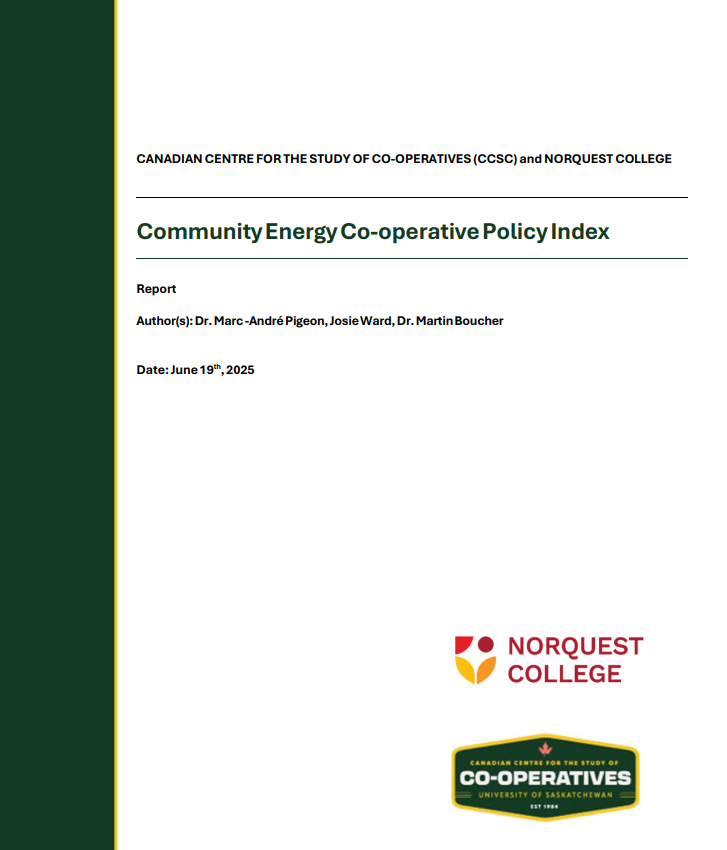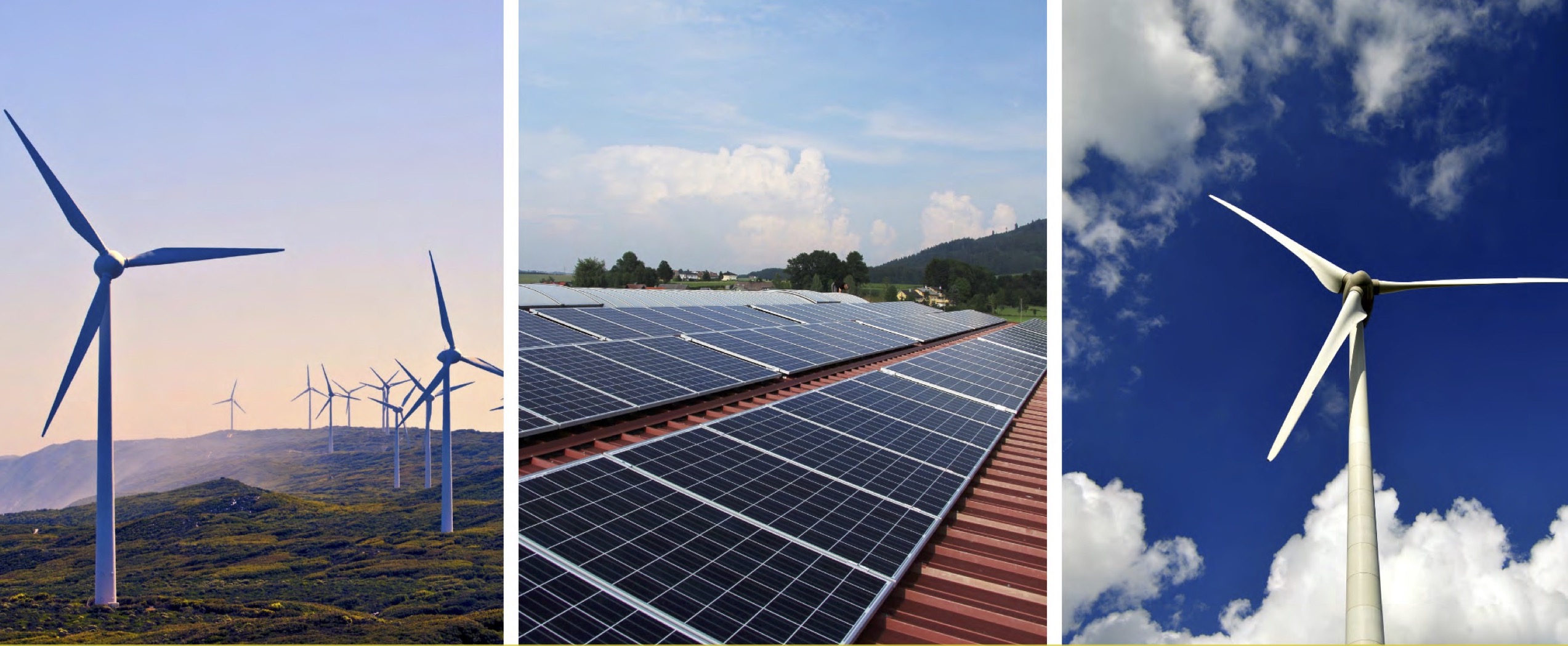Community Energy Co-operative Policy Index

This study by Dr. Marc-André Pigeon, Josie Ward, and Dr. Martin Boucher developed a comprehensive policy index to measure the receptiveness of jurisdictions to community energy production, with a particular focus on renewable energy co-operatives (RECs). This index calculated and ranked Canada’s ten provinces based on their policy support for RECs, integrating both qualitative and quantitative metrics to assess enabling (or disabling) environments for RECs in Canada.
To our knowledge, it is the first index of its kind. The index represents a powerful new tool for policy makers and practitioners to identify barriers, advocate for supportive policy environments, and advance community-led energy transitions. The index will also serve anyone tasked with increasing support for community energy in general, and RECs in particular.
Scaling Up the Impact of RECs in Canada
The Scaling Up the Impact of Renewable Energy Co-Operatives in Canada brought together 50 REC leaders, policymakers, and academics from across Canada to Ottawa from May 25-27, 2023 to discuss how RECs can make a more significant contribution to Canada’s energy transition.
Although ad hoc networks amongst RECs already exist, they tend to be mainly at the provincial level, incomplete and somewhat fragile, mirroring the disjointed nature of Canada’s energy grid in some respects. Co-operative models emphasize autonomy and independence, which can be regarded as strengths, but this can impede formal arrangements that could help RECs to expand and scale up.
With this in mind, the Scaling Up the Impact of Renewable Energy Co-operatives in Canada Summit provided a forum for REC leaders, policymakers, and researchers to meet with the following objectives:
- Share findings from Canada’s REC census and jointly identify and prioritize actions to address sectorial challenges.
- Connect REC leaders and policymakers to increase awareness and to support legislation for the renewable energy sector.
- Develop a measurable and scalable strategy allowing the REC sector to contribute to Canada’s energy transition through workshops and strategic discussions.
- Form a national REC league to advocate for the sector and support REC start-ups.
The Summit led to the creation of the Community Energy Cooperative Canada, a national organization to represent the REC sector in Canada and work with individuals and organizations across Canada to scale up community ownership and governance of energy through co-operatives.
A Census of RECs in Canada

Canada has a small but growing renewable energy co-operatives (RECs) sector. To better understand the role it currently plays and could play in Canada’s energy transition, the Canadian Centre for the Study of Co-operatives, with the support of the Co-operators, conducted a census of the sector.
The final report can be accessed here: Renewable Energy Co-operatives Census Final Report
The census collected data on everything from the amount and type of REC energy production to the size and composition of RECs boards and how many people they employed. It augmented these data with 24 semi-structured interviews to better understand the barriers and enablers to REC success.
Our Census found fifty-two RECs operating in 2021. Most generate solar energy, but an important share of them focus on wind generation. There is also a small but growing and innovative biofuels sector concentrated in British Columbia and Quebec, two provinces with large forestry sectors and abundant forestry residue that can feed energy-generating boilers. The map below outlines the location and web information of the operating RECs.
If you have any suggested edits or changes to the location and/or web information of the operating RECs presented on this map, please contact us by emailing coop.studies@usask.ca
REC Census Launch Event
On February 24, 2022, the key findings from the "A Census of Canada's Renewable Energy Co-operatives in Canada" report were shared by authors Renata Leonhardt, Dr. Marc-André Pigeon, and Dr. Martin Boucher.
Click above to watch the full recording.
The PowerPoint slides presented can be access here: 2022-02-24 A Census of Renewable Energy Co-operatives in Canada PowerPoint Slides
Creating a League of Our Own Discussion Series
Canada has set a target to achieve net-zero greenhouse gas emissions by 2050. One of the paths to reach this target is through the accelerated adoption of renewable energy technologies. This requires citizen engagement and participation. RECs represent an opportunity for citizens to engage and participate in a local and democratic form of renewable energy production. For RECs to make a meaningful contribution to Canada's net-zero objective, however, they need to find a way to scale their activities and deepen their influence with citizens, policymakers, and each other. These talks explore how RECs can make a more meaningful, and timely, contribution to Canada's efforts to achieve net-zero greenhouse gas emissions by 2050.
This discussion series served as the precursor for the Scaling Up the Impact of Renewable Energy Co-operatives Conference held in Ottawa in May 2023. Renewable Energy Co-operatives leadears, policymakers, and researchers came together to explore how the REC sector can collaborate to scale up and advance sustainable energy development.
Co-operative energy in Canada: Revolutionizing the energy transition? featuring Julie MacArthur
Canadian energy systems are undergoing significant, albeit uneven and contested, restructuring away from fossil fuel reliance and toward energy efficiency and renewables. Policy changes to spur transition have largely focused on expanding low-carbon sources of electricity and far less on the role of ownership and participation. This gap is concerning because community participation is crucial to effective energy system transformation by enhancing trust, legitimacy, and community development.Canadian renewable energy co-operatives are already active participants in energy production, distribution, retail and educational services and form part of the broader "community energy" sector. This presentation will discuss the distinctiveness, scope, and potential role of these renewable energy co-operatives in building the social and physical infrastructures needed for radical change. It will draw insights from international examples and explore some of the complexities associated with their impact and development relevant to the Canadian context.
About our speaker
Dr. Julie MacArthur is an Associate Professor and Canada Research Chair in Reimagining Capitalism at Royal Roads University. She is the author of Empowering Electricity: Co-operatives, Sustainability and Power Sector Reform in Canada (UBC 2016), co-editor of Environmental Politics and Policy in Aotearoa New Zealand (with Maria Bargh, 2022) and author of numerous articles and book chapters on energy democracy, inclusive low carbon transitions, participatory environmental governance, and comparative energy policy.
Equity, Diversity and Inclusion in Canada’s Renewable Energy Co-operatives featuring Derya Tarhan
Recent studies from Europe and Canada have shown that membership bodies of renewable energy co-operatives (RECs) predominantly consist of affluent white men. This demographic concentration points at a disconnect between REC activity and its often-assumed potential in simultaneously advancing decarbonisation and social justice. This presentation will build on interviews with leading members RECs in Ontario to identify factors driving the exclusion of marginalised and frontline communities from REC initiatives. Findings reveal that a combination of inadequate policy support and complex preparatory activities in Ontario geared the pursuit of REC development towards affluent, professional class groups with access to necessary practical capacities. The presentation will conclude with a discussion of paths forward for Canada’s REC sector and the broader co-operative movement to act on the principles of equity, diversity, and inclusion.
About the speaker
Derya Tarhan is an Assistant Professor in the Teaching Stream at the Ontario Institute for Studies in Education of the University Toronto, and a postdoctoral research fellow at Royal Roads University. His work focuses on the theory, practice, and intersections of social and solidarity economy (SSE), community development, and socio-environmental change. He also has been involved in the forming of a renewable energy co-operative in Ontario and serves as a board member of the Canadian Association for Studies in Co-operation.
Lessons from Europe: The Role of Renewable Energy Co-operative Federations
Renewable Energy Co-operatives (REC) in Canada have created opportunities to reduce carbon emissions while enhancing community connectedness and local economic development. However, RECs also face formidable barriers, including capacity issues and volunteer burnout. One potential path forward to addressing those capacity issues is having RECs come together to form a second-tier organization, often referred to as a league or federation, owned by RECs to create shared services amongst the sector. While there is currently no league representing RECs in Canada, we can look to Europe to better understand the role and potential of leagues. In this talk, Dirk Vansintjan, President of REScoop – the European federation of citizen energy cooperatives, will share the historical and current context of RECs in Europe and how REScoop was formed, and the roles REScoop play for local RECs.
About the speaker
Scaling Renewable Energy Co-operatives: Lessons from a Multi-Stakeholder Network in Solar Energy
This presentation focused on a multi-stakeholder network of renewable energy co-operatives in the Colorado solar energy industry and the lessons it offers for scaling renewable energy co-operatives. The network, consisting of five cooperative entities, has successfully promoted co-operative development and access to capital through stakeholder collaboration and innovative business models. The presentation highlighted the importance of strategic partnerships, stakeholder collaboration, and creative business models in scaling renewable energy co-operative enterprises. Attendees gained insights into how renewable energy co-operatives can leverage the power of collaboration and networking to overcome challenges to scaling, such as capital access and regulatory barriers. As the renewable energy sector continues to grow globally, the presentation provided valuable lessons for co-operatives in this industry in Canada and beyond.
About the speaker
Since its founding in 2011, Stephen K. Irvin has led Amicus Solar Cooperative as president and CEO. Amicus is the first purchasing cooperative in the North American solar energy industry, jointly owned and democratically managed by its members of solar energy development, EPC, and installation companies. Stephen also co-founded the Amicus O&M Cooperative and previously was the CFO for Namaste Solar.

